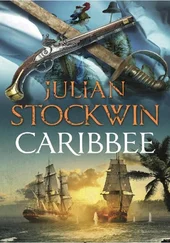Julian Stockwin - Quarterdeck
Здесь есть возможность читать онлайн «Julian Stockwin - Quarterdeck» весь текст электронной книги совершенно бесплатно (целиком полную версию без сокращений). В некоторых случаях можно слушать аудио, скачать через торрент в формате fb2 и присутствует краткое содержание. Жанр: Старинная литература, на английском языке. Описание произведения, (предисловие) а так же отзывы посетителей доступны на портале библиотеки ЛибКат.
- Название:Quarterdeck
- Автор:
- Жанр:
- Год:неизвестен
- ISBN:нет данных
- Рейтинг книги:4 / 5. Голосов: 1
-
Избранное:Добавить в избранное
- Отзывы:
-
Ваша оценка:
- 80
- 1
- 2
- 3
- 4
- 5
Quarterdeck: краткое содержание, описание и аннотация
Предлагаем к чтению аннотацию, описание, краткое содержание или предисловие (зависит от того, что написал сам автор книги «Quarterdeck»). Если вы не нашли необходимую информацию о книге — напишите в комментариях, мы постараемся отыскать её.
Quarterdeck — читать онлайн бесплатно полную книгу (весь текст) целиком
Ниже представлен текст книги, разбитый по страницам. Система сохранения места последней прочитанной страницы, позволяет с удобством читать онлайн бесплатно книгу «Quarterdeck», без необходимости каждый раз заново искать на чём Вы остановились. Поставьте закладку, и сможете в любой момент перейти на страницу, на которой закончили чтение.
Интервал:
Закладка:
"Thank you, Mrs Beckwith, salt cod will be fine with me.
Er, the ladies o' quality I think now are windin' it up and fixin' it to the top of their heads. This is damn fine fish even if I do say so. But these leaves, I can't recollect we have any of them in England."
"Sour dock an' sheep sorrel. Gives winter vittles a mort more flavour. So you're a Navy officer! Then y' must've been to some o' them great balls an' banquets with our Prince Edward! They do say they're goin' to change the name o' this island after him."
"We've only been here a short while, an' our admiral is away in Newfoundland, but I'm sure we'll be invited soon." Kydd lifted his glass; in it was a golden brown liquid, which he tasted gingerly. It was a species of ale, with an elusive tang of malt and spice.
"Seed-wheat wine—made it m'self. Tell me, Mr Kydd, in England do they . . ." She paused, frowning, at a knock on the door. "'Scuse me."
Kydd nibbled at what appeared to be a peppery-flavoured dried seaweed and listened to Mrs Beckwith's shrill voice rising, scolding, and another, quieter. She returned eventually, flushed and irritable. "It's very wrong t' disturb ye, Mr Kydd, but there's a woman here wants t' see you an' won't go away."
Kydd got up. "She's Irish," warned Mrs Beckwith. "If y' like, shall I ask Mr Cunnable t' set the dog on her?"
"No, no. I'll come."
A woman in a shawl hung back in the darkness and spoke quietly: "Good evenin' to yez, sorr—an' you're the gennelman just come ter the island an' asking after his uncle?"
"Yes, that's right."
"Then I'm t' tell ye, if tomorrow at noon y' comes with me, you'll meet someone as knows what happened t' him."
The next day, dressed economically, she was waiting motionless down the road. Kydd saw that, despite her lined face, she held herself proudly. Without a word she turned and walked away from the town.
Where the river shoreline came close she turned down a path. It led to the river and a birchbark canoe with an Indian standing silently by it. The woman muttered some words and the Indian turned his black eyes on Kydd and grunted.
The canoe was much bigger than he had imagined, twenty feet long at least, and made of birchbark strips. There were cedar ribs as a crude framework and seams sewn with a black root. It had half a dozen narrow thwarts and Kydd was surprised to see it quite dry.
In the middle part, a good five feet across, there was a mound of baggage. "If ye'd kindly get in like this, sorr," the woman said. She leaned across the canoe until she held both sides, then, transferring her weight, stepped in neatly and sat. "Be sure t' stand in th' very middle," she added.
Kydd did as he was told, sitting behind her in the front part. The Indian shoved off, swung in, and began to ply his paddle in a powerful rhythm that quickly had them out in the river and gliding along rapidly. He worked silently, his face set like stone, and the woman did not offer any conversation.
They left cleared land behind, dark green anonymous forest stretching away endlessly on both sides. Eventually the Indian ceased paddling, then spun the canoe round and grounded it at the forest's edge.
"Nearly there," the woman said. They left the Indian to follow with the baggage and took a footpath into the trees. Kydd felt as if the forest was closing in; with its hard green conifers uniformly shaped to shed snow, unknown cries and sudden snapping in the undergrowth, it was utterly different from the soft deciduous woodland of England. Kydd thought of his uncle, killed by a bear that had burst from the trees, and was afraid. Why had he agreed to this madness?
Suddenly he glimpsed the dark blue of water, and a grey spiral of smoke. "Here!" the woman said happily, as they came upon a cluster of log cabins in a patch of land leading down to the sea. She called, and a man appeared. He stood on the porch of one of the largest cabins, a big man, long-haired and with a deep chest; he wore moose-hide worked with porcupine quills.
"My husband Joseph Bourne, sorr."
The man shook hands with Kydd, looking at him keenly. Kydd felt the strength and hardness in his clasp. "I hear you knew my uncle, Matthew Kydd, Mr Bourne," Kydd said.
"Very close t' me, he were," Bourne said at length, in a deep Canadian burr. "Come inside, sit y'self down."
The cabin was snug and warm with a steeply sloping cedar-shingle roof; the logs chinked smoothly on the inside. Skins and two bear hams hung from the high beams. Woven Indian matting decorated the walls and a pair of long guns was crossed above the fire. It smelt pungently of smoke and human living.
Two rocking chairs faced the fire, and the men sat together. "M' wife got t' hear of you in town," he said, in a voice both soft and slow. "Thought I could help."
Kydd murmured something, conscious of the man's look.
"You're fr'm the Old Country," Bourne said. "Fr'm what part do ye hail?"
"Guildford, which is in Surrey."
"Very pretty, I heard."
"Mr Bourne, ye said you'd tell me of m' uncle Matthew," said Kydd.
"All in God's good time, friend," Bourne said, and leaned round his chair. "Colleen, c'n you fetch us a jug o' beer, darlin', and some moose jerky? Our guest's come a long way t' be here.
Now, y'r uncle Matthew." He collected a long pipe and tobacco pouch from the chimneypiece above the fire. "Need t' think," he said, as he stuffed the bowl and got a light from the fire. When he had it going to satisfaction, he started: "He came t' Nova Scotia fr'm the Colonies in 'seventy-eight—wanted no truck wi' revolutions an' that. Set himself up in business, an' did well for hisself. Then got destroyed by a bear in Chignecto country."
Kydd tried to hide his irritation—that much he already knew, and if the man simply wanted company . . . "Sir, it would oblige me greatly, should you—"
"His wife died in Halifax o' the fever. Had three bairns, all taken. That was in 'eighty-four." He drew long on his pipe, staring into the fire. "After that, well, I guess he took a diff'rent slant on life. Got inta business, corn tradin' an' such. Did well, laid out silver in the right place an' got him a gov'ment contract f'r the Army, set up in Sackville Street, noticed by th' governor . . . but never remarried."
"What kind o' man d'ye think he was?"
Bourne poured from a stone jug into colourful pottery tankards and offered one. From the woodsy taste, Kydd recognised it as spruce beer—it had a compelling bitterness and he decided it was an acquired taste.
"A straight arrow, I reckon. Hard worker but . . ."
"Mr Bourne?"
"But I'm thinkin' he weren't so happy, really." He lapsed again into an introspective silence.
Kydd coughed meaningfully and asked, "I have t' ask if you know anything about his bein' taken by the bear. Was it . . . quick?" His father would want details.
Bourne puffed once more, then said quietly, "Who wants t' know?"
"Why, he had an elder brother who's my papa. They parted years afore I was born, some sort o' misunderstanding. M' father's gettin' frail an' hoped t' be reconciled. Now I have to write t' him, you understand."
Bourne got to his feet, crossed to the fire and knocked out his pipe on a log. He turned, but did not resume his chair, looking at Kydd with an unsettling intensity.
Then his gaze shifted; his wife was standing rigid behind Kydd, staring at her husband. His eyes returned to Kydd. "You're a smart lad. What d' they call ye?"
"I'm Thomas—Tom Kydd." He looked steadily at the older man. "An' do I call ye Uncle?" he added softly.
In the stillness the hardwood fire snapped and spat, sending up fountains of red sparks. For a long time Bourne held his silence, until Kydd thought he had not heard. Then he spoke. "I guess you do that," he said.
"Come, lass, sit by we," Kydd's uncle said, after composure had been regained and whiskey had been downed. She moved over and sat on the floor, close.
Читать дальшеИнтервал:
Закладка:
Похожие книги на «Quarterdeck»
Представляем Вашему вниманию похожие книги на «Quarterdeck» списком для выбора. Мы отобрали схожую по названию и смыслу литературу в надежде предоставить читателям больше вариантов отыскать новые, интересные, ещё непрочитанные произведения.
Обсуждение, отзывы о книге «Quarterdeck» и просто собственные мнения читателей. Оставьте ваши комментарии, напишите, что Вы думаете о произведении, его смысле или главных героях. Укажите что конкретно понравилось, а что нет, и почему Вы так считаете.









